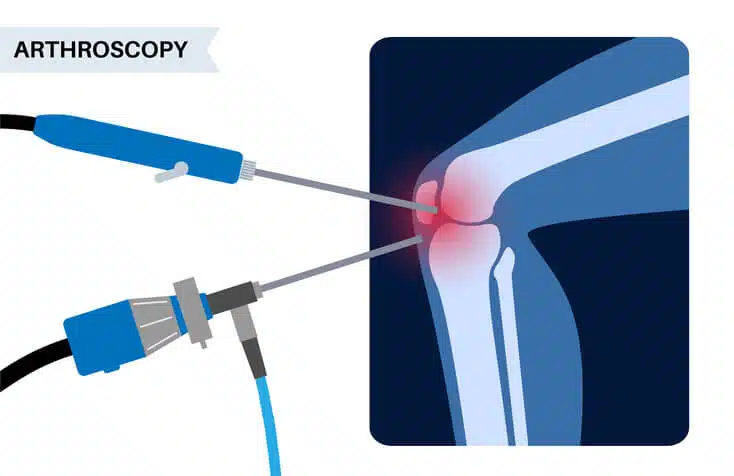
Arthroscopic knee surgery is one of the most commonly performed minimally invasive surgical procedures in the United States. Arthroscopic knee surgery involves the use of adevice, known as an arthroscope, to see the inside of the knee joint and repair the damaged joint.
If you have knee pain that is not getting better with conservative treatments and are considering knee arthroscopy,you might be wondering how arthroscopic surgery works. Let’s learn more about arthroscopic knee surgery, how it works, and where you can go for knee arthroscopy in North Dakota.
Knee Arthroscopic Surgery: What Is It
Knee arthroscopic surgery enables your doctor to reach a firm diagnosis of your knee problem as well as provide treatment of the knee problem in the same sitting using small surgical instruments.
Knee arthroscopy surgery is a great option for the diagnosis and treatment of knee fractures, inflammation of the synovium, and soft tissue injuries such as bursitis, torn meniscus, patellar tendonitis, anterior cruciate ligament tear, and medial collateral ligament tear.
How Does It Work?
Arthroscopic knee surgery is an outpatient procedure that can be performed in your orthopedic doctor’s office, surgerycenter, or a hospital.
Before the Procedure
Right before the arthroscopic knee surgery procedure, your surgical team will give you anesthesia which will prevent you from feeling any pain during the procedure.
Your orthopedic doctor or their team may use one or more of the following three types of anesthetics to prevent pain:
- Local anesthetics, which will numb the knee and prevent pain signals from traveling to the brain.
- Regional anesthetics, which will numb your body from the waist down.
- General anesthetics, which will put you to sleep so that you won’t feel any pain.
During the Procedure
For arthroscopic knee surgery, the surgical team will clean your leg and secure your knee in a stabilizing device to ensure that your knee stays in the proper position throughout the procedure and does not move.
Next, your knee surgeon will make a small incision in your knee and insert an arthroscope into the incision. An arthroscope is a long, thin and flexible tube that has a camera on one end that is used to take the images of the knee. These images will appear on the screen in the operating room. Your healthcare provider will use these pictures to diagnose knee injuries and guide the procedure.
If your orthopedic surgeon deems that you need a minimally invasive surgical procedure, they will make another incision in your knee and insert tiny surgical tools through them that will be used to repair torn tissues, remove damaged or inflamed tissues, and shave off damaged cartilage or bones.
Once a required procedure is performed or a diagnosis is made, your orthopedic surgeon will close the cuts with small bandages or stitches and wrap your knee with a large dressing.
After the Procedure
Following the arthroscopic knee surgery procedure, your orthopedic surgeon will give you some instructions that you must follow while recovering the first few days after the procedure. These instructions may include:
- Avoid putting weight on your knee(s). If possible, use crutches or a walker to move around.
- Elevate your knee above the heart level to minimize swelling and relieve pain.
- Take pain medications to manage your post-op pain and swelling.
- Keep your wound clean and incisions covered.
Arthroscopic Knee Surgery in Bismarck, ND
Arthroscopic knee surgery is a low-risk procedure compared to open surgery. It gives your orthopedic doctor a clear view of the inside of your joint, spotting minor inflammation and tiny fractures, helping your doctor confirm your diagnosis and develop a personalized treatment plan.
At The Bone & Joint Center, we offer arthroscopic knee surgery to diagnose knee injuries, repair injured bones and soft tissues like tendons ligaments, or cartilage, and remove damaged or inflamed bones and cartilage. Our highly trained and skilled orthopedic surgeons develop a customized and comprehensive treatment plan for knee problems like bursitis, tendonitis, arthritis, bone fracture, and ligament tears, among others.
If you would like to make a one-on-one consultation with one of our outstanding knee surgeons, call us today at (800) 424-2663 or make a consultation using this appointment request form. We look forward to getting you back to your life pain-free!

